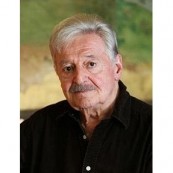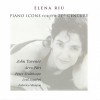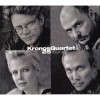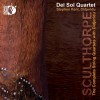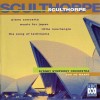| 国家: | 澳大利亚 |
| 期间: | Contemporary classical music |
传记
Peter Joshua Sculthorpe AO OBE (29 April 1929 – 8 August 2014) was an Australian composer. Much of his music resulted from an interest in the music of Australia's neighbours as well as from the impulse to bring together aspects of native Australian music with that of the heritage of the West. He was known primarily for his orchestral and chamber music, such as Kakadu (1988) and Earth Cry (1986), which evoke the sounds and feeling of the Australian bushland and outback. He also wrote 18 string quartets, using unusual timbral effects, works for piano, and two operas. He stated that he wanted his music to make people feel better and happier for having listened to it. He typically avoided the dense, atonal techniques of many of his contemporary composers. His work was often distinguished by its distinctive use of percussion.
Sculthorpe was born and raised in Launceston, Tasmania. His mother, Edna, was passionate about English literature and his father, Joshua, loved fishing and nature.[citation needed] He was educated at the Launceston Church Grammar School.
He began writing music at the age of seven or eight, after having his first piano lesson, continuing in secret when his piano teacher punished him for this activity. By the age of 14, he had decided to make a career of music, despite many (especially his father) encouraging him to enter different fields, because he felt the music he wrote was the only thing that was his own.[1] In his early teens he attempted to learn composition through studying Ernst Krenek's Studies in Counterpoint – "a pretty dreadful book" as he later described it.[2] He studied at the Melbourne Conservatorium of Music from 1946 to 1950, then returned to Tasmania. Unable to make any money as a composer, he went into business, running a hunting, shooting and fishing store in Launceston (Sculthorpe's) with his brother Roger. His Piano Sonatina was performed at the ISCM Festival in Baden-Baden in 1955[3] (the piece had been rejected for an ABC competition because it was "too modern"). He won a scholarship to study at Wadham College, Oxford, studying under Egon Wellesz, but left before completing his doctorate because his father was gravely ill. He wrote his first mature composition, Irkanda IV,[4] in his father's memory.[3]
He was distantly related to Fanny Cochrane Smith, a Tasmanian Aboriginal whose wax cylinder recordings of songs are the only audio recordings of any of Tasmania's indigenous languages. Her daughter Gladys married Sculthorpe's great-grandfather's nephew.
In 1963 he became a lecturer at the University of Sydney, and remained there more or less ever after, where he was an emeritus professor. In the mid-1960s he was composer in residence at Yale University.[3] In 1965 he wrote Sun Music I for the Sydney Symphony Orchestra's first overseas tour, on a commission from Sir Bernard Heinze, who asked for "something without rhythm, harmony or melody". Neville Cardus, after the premiere of Sun Music I, wrote that Sculthorpe was set to "lay the foundations of an original and characteristic Australian music".[6] In 1968 the Sun Music series was used for the ballet Sun Music, choreographed by Sir Robert Helpmann, which gained wide international attention. In the late 1960s, Sculthorpe worked with Patrick White on an opera about Eliza Fraser, but White chose to terminate the artistic relationship.[3] Sculthorpe subsequently wrote an opera (music theatre), Rites of Passage (1972–73), to his own libretto, using texts in Latin and the Australian indigenous language Arrernte. Another opera Quiros followed in 1982. The orchestral work Kakadu was written in 1988.
In 2003, the SBS Radio and Television Youth Orchestra gave the premiere of Sydney Singing, a composition by Sculthorpe for clarinet solo (Joanne Sharp), harp solo (Tamara Spigelman), percussion solo (Peter Hayward) and string orchestra. This performance was released on SBS DVD in July 2005.
His Requiem was possibly his most serious, substantial work.[citation needed] It was premiered in March 2004 in Adelaide by the Adelaide Symphony Orchestra and Adelaide Chamber Singers conducted by Richard Mills, with didgeridoo soloist William Barton, to critical acclaim.
Sculthorpe was a represented composer of the Australian Music Centre and was published by Faber Music Ltd. He was only the second composer to be contracted by Faber, after Benjamin Britten.[3]
His autobiography Sun Music: Journeys and Reflections From a Composer's Life was published in 1999.
He died on 8 August 2014 at the age of 85.





